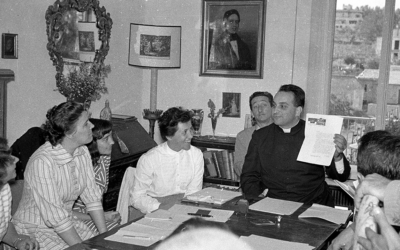
One leading initiative in Latin America called “Project Innocence” is being promoted by the Faculty of Law at the Manuela Beltran University of Bogota. The project aims at re-opening court cases of people who have been wrongfully convicted and lack the financial resources to pay for their defense. Project Innocence offers its legal services for free.
The project began in 2007. Project director, Juan Carlos Cardenas C. explains: “Most of the cases we deal with have to do with negligence or wrongful identification of the perpetrators of crimes. They are cases in which judiciary officials fail to carry out their duties because of negligence, lack of training, lack of evidence or false testimony, but also because of corruption, and they make wrong decisions that unjustly convict a person.”
Project Innocence is composed of an interdisciplinary work group, with psychologists, lawyers, detectives and, naturally, students in this field.
Divided into working groups, representatives of Project Innocence visit penitentiaries for both, men and women, twice a week. The detainees of these penitentiaries sign to be accepted into the project. Requests are often made on their behalf by relatives and friends. And claims of innocence are often submitted through electronic post via the website.
A professional lawyer, a monitor, and a student in the field of psychology or law are usually present at the interview. The project director stresses: “We never lose sight of the fact that this could be the only opportunity for this person to be heard.”
“Usually,” explains Lawyer Cardenas, “the inmates claim that there was a mistake in the trial and sentencing. For this reason it is important to have someone with deep and serious training. We start with the respect and belief that all the judgements issued by the courts are based on the principle of law and righteousness. It is even more difficult, therefore, to demonstrate to the administrator of justice that it has made a mistake, after it has made a final ruling. In principle, therefore, our efforts are not to identify the official who has made a mistake, but rather to show where and what the mistake was in the process that led to the conviction of an innocent person.”
 The cases that arrive at Project Innocence include things such as kidnapping, murder, sexual offenses, extortion, money laundering, but the people behind these cases are innocent and have been unjustly accused and deprived of their liberty. Like the case of Manuel Mena, who was sentenced to seventeen years in prison for a murder he did not commit. After three and a half years in prison and the rigorous work carried out by the team at the University, analyzing the facts and evidence in the case, the Constitutional Court annulled the sentence of conviction and ordered his immediate release.
The cases that arrive at Project Innocence include things such as kidnapping, murder, sexual offenses, extortion, money laundering, but the people behind these cases are innocent and have been unjustly accused and deprived of their liberty. Like the case of Manuel Mena, who was sentenced to seventeen years in prison for a murder he did not commit. After three and a half years in prison and the rigorous work carried out by the team at the University, analyzing the facts and evidence in the case, the Constitutional Court annulled the sentence of conviction and ordered his immediate release.
The professor concludes: “Detainees are among the most needy in the population, in need of help and solidarity; not only the innocent, but also those who are going through the process of rehabilitation and are in need of a friend’s hand, some counsel, a listening ear. The world of criminal justice is also in need of a transformation by the Gospel and by the truth. And this little project we are involved in is, for us, a tiny seed of this renewal.”
(Experience shared at the International Symposium on Fraternity, 4 April 2012, at Manuela Beltran University)
Juan Carlos Cárdenas is the director of “Project Innocence”. He teaches Law at Manuela Beltran University of Bogota, Colombia and has been actively involved in the Focolare Movement from when he was young having embraced the spirituality of Chiara Lubich.
To read more experiences in this field visit: http://comunionediritto.org/en/




0 Comments